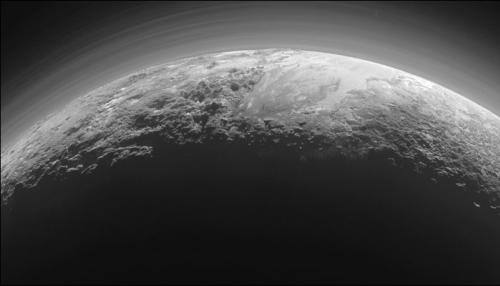- News>
- Space
Pluto should regain its planet status: Experts

The definition approved by the International Astronomical Union (IAU) in 2006, demoted Pluto to `non-planet,` dropping the number of planets in our solar system from nine to eight.
Washington: Pluto should be defined as a planet, along with over 100 celestial bodies in the solar system, including the moons of Jupiter and Earth, according to scientists who argue that the icy dwarf had been wrongly demoted.
The definition approved by the International Astronomical Union (IAU) in 2006, demoted Pluto to "non-planet," dropping the number of planets in our solar system from nine to eight.
The change - a subject of much scientific debate - made no sense, said Kirby Runyon, a scientist at the Johns Hopkins University in the US.
Icy, rocky Pluto had been the smallest of the nine planets, its diameter under three-quarters of the moon and nearly a fifth of the Earth.
Still, Pluto "as everything going on on its surface that you associate with a planet. There is nothing non-planet about it," Runyon said.
Researchers argue for a definition of planet that focuses on the intrinsic qualities of the body itself, rather than external factors such as its orbit or other objects around it.
They define a planet as "a sub-stellar mass body that has never undergone nuclear fusion," that has enough gravitational heft to maintain a roughly round shape, even if it bulges at the equator because of a three-way squeeze of forces created by its gravity and the influence of both the sun and a nearby larger planet.
This definition differs from the three-element IAU definition in that it makes no reference to the celestial body's surroundings.
That portion - which required that a planet and its satellites move alone through their orbit - excluded Pluto.
Otherwise, Pluto fit the IAU definition: it orbits the Sun and it is massive enough that the forces of gravity have made it round.
Researchers have argued in the past that the IAU definition also excludes Earth, Mars, Jupiter and Neptune, which share their orbits with asteroids.
The new geophysical definition omits stars, black holes, asteroids and meteorites, but includes everything else in our solar system. It would expand the number of planets from eight to about 110.
That expansion is part of the appeal of the new definition, said Runyon.
The new definition, which does not require approval from a central governing body, is also more useful to planetary scientists, researchers said.
Most of them are closely affiliated with geology and other geosciences, thus making the new geophysical definition more useful than the IAU's astronomical definition, they said.
